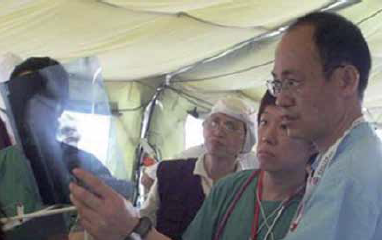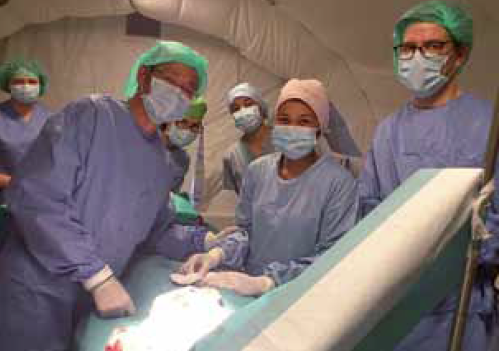© Hong Kong Academy of Medicine. CC BY-NC-ND 4.0
DOCTOR FOR SOCIETY
A consultant surgeon on-call 24/7: an interview with Dr YK Au
Brian YO Chan, Adrian HK Yu, Selene SW Yu
MBChB 2013-2015, Faculty of Medicine, The Chinese University of Hong Kong
Have you ever been on-call 24/7 for more than a
month? Performing operations belonging to six
different specialties? Have there been any life-threatening
moments in your work such that
emergency evacuation within minutes is needed?
Meet Dr Au Yiu-Kai, a consultant surgeon of Kwong
Wah Hospital, the founder of Hong Kong Wheelchair
Aid Service, and an all-time medical volunteer of the
Hong Kong Red Cross and Médecins Sans Frontières
(MSF).
With three decades of medical humanitarian
experience, both locally and beyond, Dr Au is a vivid
example of constant commitment and dedication to
underprivileged populations. As a young man, he
had great concern for societal issues. Unmet medical
needs were widely prevalent in the 1980s in Hong
Kong. Since 1987, he has been providing free medical
services to retired old miners and their families in the
Ma On Shan village on a monthly basis. In 1997, he set
up the Hong Kong Wheelchair Aid Service with his
colleagues, with a mission to protect wheelchair users
from unnecessary injury and enable them to perform
activities of daily living more independently. In 2002,
Dr Au became a medical volunteer of both Hong Kong
Red Cross and MSF, two major global humanitarian
organisations that aim to protect life and advocate
importance of human dignity. Through his work with
these organisations, he served populations affected
by wars and natural disasters in Liberia, Indonesia,
South Sudan, Thailand, and Mainland China.
Great things start simple. Dr Au’s heart for
charity work dates back to his early education with
a Catholic background, which emphasised the
importance of contributions to society. This simple
yet key message planted the seed for volunteer
service during his adolescent and medical school years. In 1978, when he was a first year medical
student, following the Wah Fu Estate tragedy, where
two children were orphaned following their parents’
death from liver cancer and suicide, he initiated a
fundraising campaign to provide financial support
for the children. This incident impressed upon him
the importance of community care, and the fact that
simple tender loving care can be very reassuring to
the sufferers even if it appears as a small contribution
in the big picture. It encouraged him to launch
more extensive and daring programmes to help the
community. After his graduation, Dr Au initiated
the “Community Health Development Programme”,
wherein junior medical staff provided simple physical
checkups to the public every Sunday. In 1987, Dr Au
initiated a monthly outreach service to residents in
Ma On Shan, which provided free consultations for a
duration of nearly three decades. To date, he and his
team have made up to 300 visits to that area, delivering
quality primary health care.
The call to go global reached Dr Au shortly
after the end of the second millennium after Jesus’
birth. Having reached a certain peak in his career,
Dr Au started having a heightened awareness of the
global condition, as well as reflecting upon his future
contributions to the society. He noticed the natural
disasters and anthropogenic hazards as well as the
unmet medical needs which could benefit from the
knowledge and skills of medical doctors. It was also the
boom of laparoscopic surgery, not only in Hong Kong
but also in Mainland China. In Hong Kong, junior
doctors became more interested in manipulating
sophisticated laparoscopic equipment as opposed to
mastering traditional and basic surgical techniques.
In China, the fervent for advanced technology was
equally strong, yet rural areas remained in absolute poverty. With these considerations in mind, Dr Au
embarked upon humanitarian projects organised by
the International Committee of the Red Cross, with the
hope of finding a position whereby he could contribute
to the needy and the deprived, whilst, simultaneously,
testifying to the value of traditional surgical skills.
He later realised that he was the first doctor in the
Hospital Authority to join such mission trips.
The year 2001 marked an important milestone.
For the very first time, international borders no
longer limited Dr Au’s service. Spending three and
a half months in the world’s largest war hospital at
Lokichokio, northern Kenya, Dr Au dedicated himself
to saving victims of the civil war in southern Sudan.
At times, there were operations that needed skills
beyond the usual practice. Basic surgical principles
became crucial in these situations and became pivotal
in the surgical theatre. This phenomenon was fondly
described as the ‘Surgical Bible’: despite encountering
an operation that you have never performed before,
you can read it up, and quickly apply the new
knowledge in performing any operation. This was
the reason why Red Cross preferred general surgeons
to highly specialised surgeons who only operate on
a specific body part or who can only operate with
sophisticated technology. Some unusual surgeries
that Dr Au performed included partial penectomy,
caesarean sections, eyeball debulking, craniotomy,
and even groin flaps. In this primitive land where state-of-
the-art technology was not available, Dr Au gained
confidence in his skills. These experiences served to
establish the fact that basic surgical principles are
most important. The lack of resources and danger did
not daunt him from returning; rather, it encouraged
him to serve more people.
There was still one more hurdle to overcome.
As a consultant surgeon, he could not leave the
hospital and serve in a foreign area miles away from
Hong Kong for a prolonged period of time. When
he expressed his concerns to Dr Yip Wai-Chun, then
Chief of Service at Kwong Wah Hospital Department
of Surgery, Dr Yip’s response was: “How can I not
help you for such a noble cause?” Hence, he assigned
a senior surgeon to cover for Dr Au’s duties while he
was away. This enabled him to embark on yearly relief
work for the next 12 years.
Colleagues’ support proved vital in Dr Au’s
endeavours, and it was something he treasured very
much. One of his fondest memories was mastering
the skill of performing caesarean sections, which
was an essential obstetric operation in war zones
and poverty-stricken areas. Under the enthusiastic
arrangement of Kwong Wah Hospital, he was allowed
to rotate with obstetricians and observe multiple
caesarean sections. Numerous senior obstetricians
taught him the essentials and special tricks of the
surgery so that he could master it in a short time.
As you can imagine, however, unpredictable security concerns do exist while working in war
zones. In 2008, just days before departure to Somalia,
an MSF team was attacked, resulting in the killing of
three persons including one surgeon. Fear shrouded
over Dr Au, and he started making preparations to
face the worst situations. During his 2012 outpost to
Pakistan, two Red Cross workers were kidnapped by
Taliban troops and executed weeks before departure.
Vigorous security meetings were put into place, with
constant updates regarding the latest intelligence.
Despite all that, an emergency evacuation within 5
minutes was activated, with none of the team allowed
to make contact regarding their evacuation route and
timings, until they departed safely to Islamabad.
Looking back, Dr Au feels that his participation
in humanitarian medical work, both locally and
globally, in large- and small-scale operations has
served to provide him with a unique perspective
towards life. A heart for charity work and enthusiasm
for adventurous opportunities were naturally
fundamental for his achievements, but Dr Au also
remarked that all milestones in life that progressively
led him to global operations were incidental. He
sincerely thanks his colleagues and supporters for
helping him throughout the years. Entering his 50s,
he feels rejuvenated by these annual missions, and
continues to look forward to more. On the one hand,
he was driven by the unmet medical needs around
the world; on the other hand, he wanted to retain the
precious skills of basic surgical techniques, which he
felt were irreplaceable despite the impact of evolving
medical technology. Another important task at hand
was heritage—passing on these important messages
to the next generation. For this reason, he has been
actively sharing these experiences with all those who
were interested in humanitarian work, including
medical students. For future doctors-to-be, Dr Au has
two important messages: (1) do not be confined to
Hong Kong, and (2) avoid over-dependence on high
technology and overlooking the importance of basic
surgical skills.
It is hoped that Dr Au’s spirit will be passed
on to the future generation, and that his story
inspires youngsters to think ahead, look globally, and
contribute more to society!



